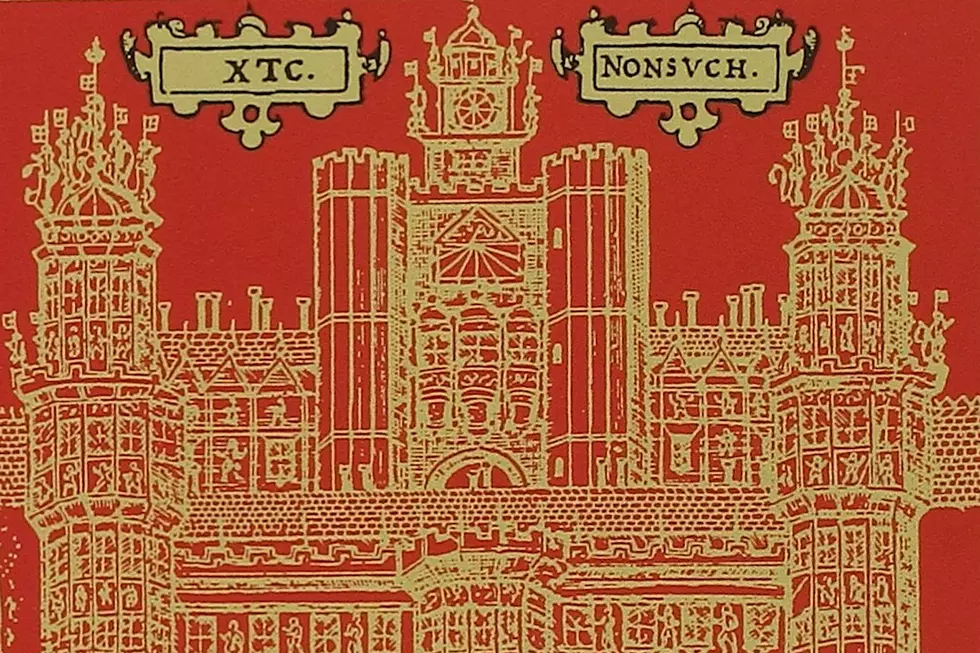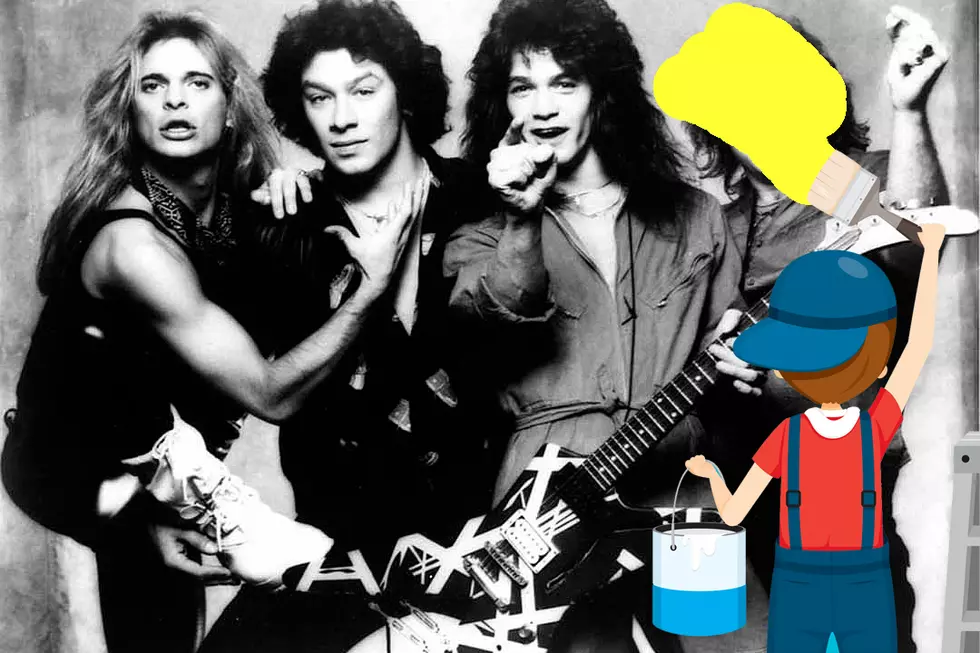
30 Years Ago: XTC’s Struggles Continue on Lush, Ignored ‘Nonsuch’
XTC had long toiled in unfair obscurity. They got as high as the U.K. Top 5 with 1982's English Settlement after just missing the Billboard Top 40 with 1980's Black Sea. But then XTC stopped performing in concert because of Andy Partridge's crippling stage fright.
"When we were playing live, I felt as if we were howling out in the wilderness and no one was particularly listening," Partridge told The Boston Globe in 1992. "You can stir into that discontent a big pinch of stage fright that got worse and worse. I think my subconscious was telling me, 'Look, you don't want to be doing this, so I'm going to make it difficult for you to do.'"
Their music became more interesting, with deeper lyrical themes and exciting new complexity. But XTC struggled to recover on the charts. That is, until 1989's sun-speckled Oranges and Lemons. The LP represented XTC's best showing on both U.S. and U.K. charts since English Settlement, and produced their highest-ranking U.S. single in "Mayor of Simpleton."
Then XTC's career started doing XTC things again.
Steve Lillywhite and Hugh Padgham were set to return to coproduce a follow-up, but then Lillywhite dropped out over scheduling issues. Padgham didn't feel he had the time to produce the record himself. Tom Lord-Alge and Led Zeppelin's John Paul Jones were reportedly too expensive. There was also a flirtation with Bill Bottrell, who'd engineered Dangerous for Michael Jackson, but XTC were left at the altar again.
Meanwhile, they were still in litigation with an ex-manager. Partridge's marriage was failing. They also still had to secure a drummer, since XTC stopped employing one when they left the road.
Is it any surprise that Partridge was hard at work completing a song called "The Disappointed"? "My marriage, my disappointment with that, is in there," Partridge told Todd Bernhardt in 2009. "I think the disappointment with the musical career, with not getting the recognition that I thought we were due, and certainly not getting the financial recompense that we were due, is in there. All that genuine disappointment filtered into this."
Listen to XTC's 'The Disappointed'
XTC finally tabbed drummer Dave Mattacks of Fairport Convention and he, in turn, recommended Gus Dudgeon, a veteran producer who arrived with a resume including Elton John, David Bowie, Queen and the Bonzo Dog Doo-Dah Band. (The latter convinced Partridge and coleader Colin Moulding.) Dudgeon also arrived with an overflowing briefcase of quirks – but XTC were too antsy to push back.
At this point, Partridge told Past Daily, he "would have done it with the window cleaner." Things had taken so long to get going that Moulding and bandmate Dave Gregory were reportedly reduced to working at a car-rental store to stay afloat between royalty payments.
Mattacks walked into a situation that might have felt hermetically sealed, considering how long XTC had spent tinkering while all of this played out.
"Though it was challenging, it wasn't difficult. The experience was enjoyable - great songs!" Mattacks told Jason Ritchie in 2003. "Some drum parts were mine – 'My Bird Performs,' for example. Others had loosely defined demo drum-machine parts programmed by Andy, which I used as templates."
Partridge liked what they ended up with, as XTC created a more orchestral, more thoughtful distillation of elements from their previous two albums – with a dash of their psychedelic the Dukes of Stratosphear side venture. It may have been determinedly uncommercial at times, but the album was shaping up to be something far more artistically honest than simply trying to create with an eye for the stage.
"The thing is, we're getting older and crustier – and we're getting better," Partridge told Vox in 1992. "I hope that we get more and more crusty, insular and selfish. Musically, I've become extremely selfish, and I don't feel I have to please anyone else. I mean, it doesn't extend to other areas. I'm not going to start axing people to death in an attempt to get to the front of supermarket queues, but on the musical side I have to be pleased, otherwise, it's pointless."
Partridge remained wary of losing artistic control, however, since something similar had happened the last time XTC worked with a well-known figure on 1986's Todd Rundgren-produced Skylarking. So when Dudgeon suggested that they omit Partridge's song "Rook," it created a wound that never quite healed. Dudgeon later announced that he wanted to handle the final mixing of the LP himself, and Partridge simply refused. With tension rising, XTC fired him.
Listen to XTC's 'My Bird Performs'
Genesis engineer Nick Davis came in to sew things up, as they looked for an album image to match the title: Nonsuch, which Partridge said spoke to the project's strange and delightful musical alchemy. "It's usually words and phrases that get stuck in my head like some sort of fishhook that I can't get out," Partridge told Past Daily, "and with a mind to finding some kind of ribbon that would tie up any given bouquet of disparate songs which makes up an album, because they're all totally disparate blooms."
Only later did Partridge realize, even more appropriately, that "Nonsuch" was the name of an incredibly ornate palace built by Henry VIII atop an entire razed village.
There would be one final issue: The head of Virgin Records didn't hear a hit. Partridge told Past Daily that he rejected the LP while demanding "12 Top 10 guaranteed singles." The label executive eventually stepped down, but not before XTC again lost whatever momentum they'd managed. It had now been two long years since the Moulding-composed "King for a Day" became XTC's most recent U.K. charting song.
Released on April 27, 1992, Nonsuch got off to a respectable start. XTC initially matched the U.K. ranking for Orange and Lemons, reached No. 1 on Rolling Stone's college album chart and was nominated for Best Alternative Music Album at the Grammys. "The Ballad of Peter Pumpkinhead" topped Billboard's alternative-rock list, but XTC scheduled no shows and Nonsuch quickly disappeared.
Virgin's not-very-helpful ad slogan revealed both their frustration and benign neglect: "Still Not on Tour (Cheer up, there is a new album)." Partridge was unmoved. "I see nothing wrong with just being a record-making group," he told The Boston Globe. "I figure, you go into a store and buy a slice of our soul on disc. Why on earth would you want to see our carcass for any worship purposes or whatever?"
Instead, XTC vanished. Months turned into years, with no new songs. Virgin patched together Fossil Fuel: The XTC Singles 1977–92, and the compilation reached the U.K. Top 40 in 1996. But XTC's final two albums wouldn't arrive until the decade's end – and they were pointedly not released on Virgin.
"They did no promotion whatsoever," Partridge told the Phoenix New Times in 2000. "When I said we don't want to play live anymore, they completely stopped bothering. We were on the label 20 years and we never made a penny from the sale of our albums. We ran on negative equity for 20 years. Two weeks after we left the label in '97, we went into profit for the first time."
Ranking Every XTC Album
More From The Basin's Classic Rock










